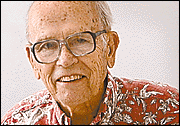


Hawaii’s World
A Honolulu ophthalmologist is a front-line warrior in the World Health Organization's drive to eliminate curable blindness worldwide by 2020. A fighter against
blindnessDr. Stephen Miller of Kaiser-Permanente's Honolulu Clinic is recently back from another vacation month spent -- at his own expense -- in Asia helping give eye-care training in areas where few doctors are familiar with it.
He works with a Berkeley, Calif.-based organization called SEVA, the Sanskrit word for service. SEVA gets its main support from individuals and from musicians dedicating part of their concert proceeds.
Miller has been giving a month a year for 10 years, paying his own travel and living expenses. He has worked previously in India and Nepal. This time, after a stop at a World Health Organization meeting in Beijing, he and his wife paid a third visit to Tibet. She is not a nurse but nevertheless assists him.
Polio is pretty well licked worldwide. Why not curable blindness?
Cacaracts are its biggest cause, with blindness described as an inability to distinguish the big letter E atop an eye chart's pyramid.
SEVA uses the philosophy of training people to fish rather than fishing for them. It aims primarily to give eye care know-how to local doctors or the regional equivalent of our physicians' assistants.
They use simpler tools than in America and need only 15 minutes for most operations. Some do 40 a day -- versus perhaps one an hour at Kaiser here.
Miller says there is a slight loss of quality in the shorter Tibet procedures, but not too much in view of the tremendous need. Nearby Cambodia has only one ophthalmologist for 20 million people. He helped bring 100 eye-trained medics to Nepal for a similar population and now is aiding smaller Tibet with 2 million people.
In SEVA's work the language barrier is real but surmountable with translators. Tibet has no words for "optic" or "nerve." Graphics help overcome this.
The usual cataract operation includes installation of a plastic lens inside the eye. This reduces the need for thick, heavy eyeglasses that can be scratched. SEVA has these lenses made in India for a lot less than they cost in the United States.
SEVA also practices a kind of Robin Hood capitalism. People who can afford it may be charged twice the actual cost in order to subsidize those who can't pay.
Chinese-Tibetan conflicts assure that Tibet is not everybody's favorite country despite its mountainous beauty. The capital, Lhasa, is 11,800 feet high in the Himalayas. The Chinese are most present there, Miller says, less so outside the capital.
SEVA tries to stay free of internal politics. It works under a nongovernmental agency called the Tibet Development Fund. One of the fund's co-chairmen is the son of a Chinese leader. The other is a Tibetan who was imprisoned by the Chinese. The pair-up helps give the fund public credibility.
Miller said clinics where he works are of reasonably modern quality and says the same about its hotels -- not super but OK.
In Economics 101 I was persuaded that all people are selfish almost all the time, but that self-interest or selfishness has many manifestations. One is the personal satisfaction gained from deeds well done. Dr. Miller and his SEVA colleagues are harvesting quite a lot of that.
A.A. Smyser is the contributing editor
and former editor of the the Star-Bulletin
His column runs Tuesday and Thursday.